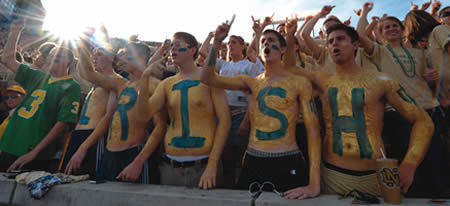I am a member of the Lost Generation of Notre Dame Football.
We entered Notre Dame and graduated between 1994 and 2012. The names we remember aren’t Hemingway, Fitzgerald and Eliot. They are Davie, Willingham and Weis.
Some of us would be old enough and lucky enough to have witnessed the 1988 championship season, but most had a childhood either forged during or in the aftermath of 1993, when a field goal (and questionable polling) destroyed another chance for football glory.
As children, as adolescents and as adults, we never thought it would be this long before we played for another championship. Other Notre Dame graduates, particularly those who attended between Leahy and Parseghian, have experienced fallow periods. But never has it been so long and so hard.

Part of this is the relentless information storm created by the internet and the growing ESPN-ification of the sports media complex, wherein endless debates over “relevance” and other ill-defined terms are used to grab eyeballs. There are also the gratuitous websites, each devoted to their own particular set of fandom, where schadenfreude is a sustaining life force, particularly if it involves the boys in the gold helmets.
And the team gave them plenty of material.
In my four years as a student, our football record was 29-19, which is, sadly, not the worst four-year stretch on record. There were some great games and even some good years, but there was always a nagging sense that the program was, athletically, on the outside looking in.
Sure, in my freshman year, we went to the Fiesta Bowl with a 9-2 record, but Oregon State squashed us, 41-9, giving me a lasting image of future pro Chad (Ochocinco) Johnson running into the end zone for a touchdown about thirty feet in front of me, even though he dropped the ball two yards earlier.
And then my junior year was the famed “Smoke and Mirrors” season, where the team used defense and special teams to go undefeated for eight games but finished just 2-3 the rest of the way, ignominiously losing to N.C. State in a bowl game where a fumblerooski actually worked.
But none of that was the worst part. The worst part was — no matter how diehard each of us may have been in our fandom — the nagging doubt that maybe the people who said we could never reach the Promised Land again, were right.
In this 19-year interim between top rankings, we raged against the dirtier aspects of college sport: the terrible graduation rates, oversigning players, “grayshirting,” the slow turn of amateur athletics into an NFL-like institution. We raged because there was a chance that success in the classroom and success on the field could never be married.
We drew what hope we could when the #1 sign on Grace Hall was lit for women’s basketball, women’s soccer, and fencing. That was evidence, we said, that it was all possible. Then the years went by, at first slowly, then quickly, building into an argument that those bulbs would never burn at their brightest for the sport that remains the soul of this university.
Until now.
When the clock hit triple-zero on Saturday night, I was lucky enough to be watching the game in a Pennsylvania bar with my brother, Kevin ’02, another member of the Lost Generation. I’m not sure what we exactly said in those moments, as a few beers were needed to even out our heart rates, but I know we embraced in a clench of relief and joy.
Faith, as the scholars would say, is a tricky thing. And it took all of our strength to stubbornly hold onto the vision of great men like Sorin and Hesburgh, that excellence — undiminished excellence — is possible and attainable in all parts of a university. That a place like Notre Dame is where our achievements in tests and papers and research can be fully met with achievements in passing, rushing and touchdowns.
There is a game left to be played in Miami, and it is possible that Notre Dame will not win, and that the team will fall short of the ultimate prize. As a fan, that will be disappointing, and hope will have to burn for another year.
But life will be different now.
For once I was lost, but now I am found.
Liam Farrell is this magazine’s senior alumni editor. Contact him at lfarrell@nd.edu.